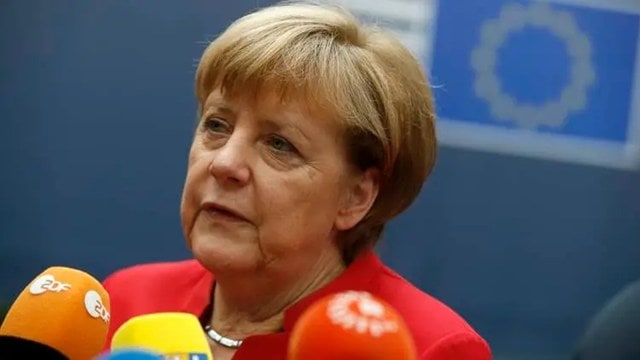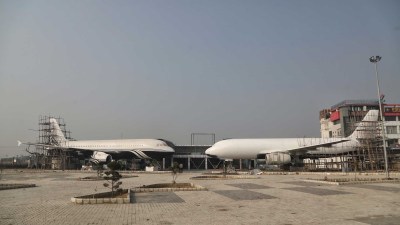HOW ANGELA Merkel, as Germany’s environment minister, struck a rapport with then Indian environment minister Kamal Nath in 1995; Nath’s advice on how to bring about a consensus in the climate conference in Berlin; how Chancellor Merkel came to better understand the misgivings of emerging countries toward affluent nations from Dr Manmohan Singh; and how she raised the issue of attacks on minorities by Hindu nationalists with Prime Minister Narendra Modi, who vehemently denied it — all these are part of Merkel’s much-awaited autobiography, “Freedom: Memoirs 1954 – 2021”, published by Pan Macmillan.
In the book Merkel recalls, as the host country’s environment minister at the UNFCC in Berlin in 1995, “I quickly developed a friendship with the Indian environment minister Kamal Nath. India played a very constructive role in the conference. Time flew by. Negotiations were held from first thing in the morning to last thing at night. Cornelia Quennet-Thielen and all my other colleagues worked to the point of exhaustion. Representatives of developing and developed countries were constantly at loggerheads. The NGOs added fuel to the fire.”

“When there was still no outcome by the morning of April 7, I feared that all the effort had been in vain. Time was slipping through my fingers… I shared my distress with Kamal Nath. The first thing he told me was that he had to leave that evening. There was nothing I could do to make him change his mind. Urgent domestic matters were calling him. I was shocked. But then he gave me some advice. He told me to split up the group of “Friends” — representatives of the developed countries on the one hand and representatives of the developing countries on the other. The groups would work in separate rooms during the negotiations, while I would shuttle between the groups as a mediator. ‘I think both groups trust you’, he said. Kamal Nath’s advice was convincing. It was about finding the eye of the needle that everything could be pulled through. My frustration had suddenly disappeared and I set to work. Kamal Nath had drawn back the curtain for me.”
Later, the mandate for the negotiation of a protocol for the Framework Convention on Climate Change — the Berlin mandate — was adopted, which contained both the commitment to binding greenhouse gas reduction targets and the possibility of joint implementation. It paved the way for the landmark Kyoto Protocol in 1997 — an international treaty that set legally binding targets to reduce greenhouse gas emissions.
As Chancellor, Merkel wrote, “I had long been convinced that the economic successes of China and India would shift international power relations significantly in their direction. That’s why I wanted to develop closer relationships with both countries. In 2010, I suggested to President Hu (Jintao) and Prime Minister (Manmohan) Singh that we hold regular bilateral intergovernmental consultations. Both agreed. The first German–Indian intergovernmental consultations took place in early June 2011 in New Delhi… India was the most populous democracy in the world. The first two German–Indian intergovernmental consultations of 2011 and 2013 were led on the Indian side by Prime Minister Manmohan Singh. I had met Singh in April 2006 when we officially opened the Hannover Messe together, where India was the partner country.”
“His (Manmohan Singh) primary aim was to improve living standards for the two-thirds of India’s 1.2 billion population who lived in rural areas. This amounted to 800 million people, 10 times Germany’s entire population. In my conversations with him, I came to better understand the misgivings of the emerging countries toward us, the affluent countries. From his perspective, we expected them to take great interest in our problems, but we weren’t prepared to offer them the same courtesy. I could see his point, and began to study more closely the challenges faced by the emerging countries. Singh told me about the cultural diversity of his country, a sub-continent with more than five thousand years of history,” she said, adding that “India is more comparable with the European Union as a whole than with one of its member states”.
Recalling her meetings with PM Modi, she wrote, “In May 2014, Singh was succeeded by Narendra Modi. He belonged to the Hindu-nationalist Bharatiya Janata party and preferred to speak Hindi, India’s official language, alongside English. We had met for the first time in April 2015, also during the opening of the Hannover Messe, when India was partner country for a second time. Under the motto ‘Make in India’, 400 companies were exhibiting their products. At the opening ceremony, Modi emphatically promoted India as a location for investment, speaking English as an exception, and impressed everyone there with a cultural program that contained elements of augmented reality. I held my breath as a deceptively real-looking Asiatic lion stepped out of the back wall, roared loudly, padded downstage toward the audience, and promenaded through the middle aisle of the Hanover Congress Center. Modi loved visual effects. He told me about election campaigns in which he’d spoken in a studio and had his image projected as a hologram to more than 50 different locations, where thousands of people were listening to him in each. I asked how the listeners had responded to that kind of virtual presence. He reported that many people had waited for him at the end of his speech, wanting to shake his hand, even though they knew he wasn’t really there.”
Story continues below this ad
She also wrote about her religious freedom discussions with PM Modi. “I followed with concern the reports that, since Modi had taken office, an increasing number of members of other religions, predominantly Muslims and Christians, were being attacked by Hindu nationalists. When I broached the subject with Modi, he vehemently denied it and emphasized that India was and would remain a country of religious tolerance. Unfortunately, the facts said otherwise. We were unable to agree on this point. My worries remained — religious freedom is, after all, a key component of every democracy.”
“Modi’s focus was also on improving Indians’ living standards, especially for the rural population. He boosted economic growth, in particular by tackling the countless bureaucratic hurdles that lurked everywhere. He appointed a staff member in his office as a contact person for companies experiencing difficulties with their projects. This gave rise to a so-called fast track for investments,” she wrote.
In October 2015, the third German–Indian intergovernmental consultations took place in New Delhi. “Because Modi had heard about my love of classical music, he arranged a small concert for all the participants after the lunch. He had a piece of music composed especially for the occasion. It was premiered by an orchestra playing on both Indian and European instruments — a symbol of our cultural ties. I loved moments like this on my official appointments; they not only gave me the opportunity to better understand my conversation partners and their views, but also exposed me to new cultural worlds. This also gave rise to an atmosphere of intimacy from which it was easier to find political compromises,” she wrote.









